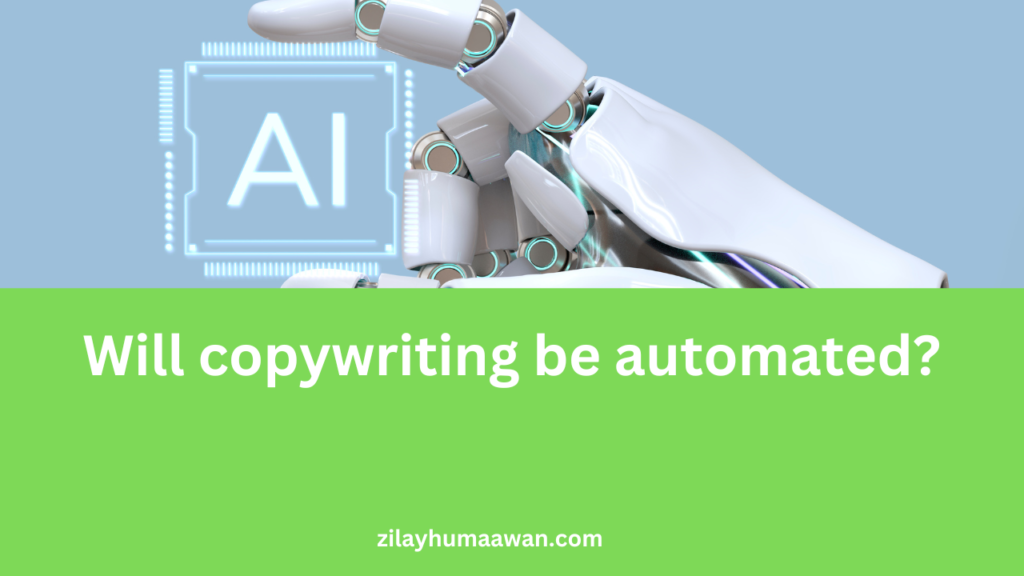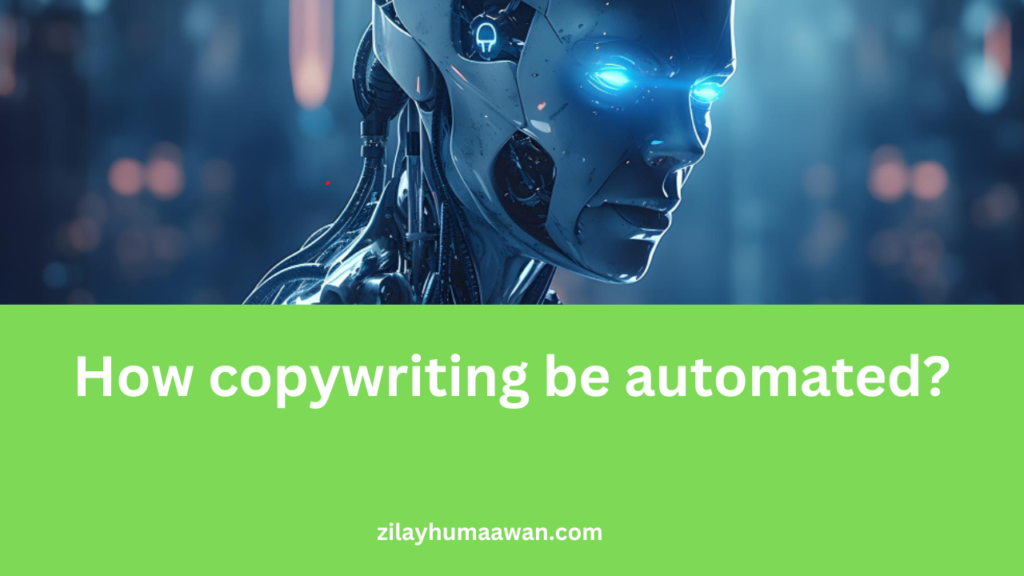In a world evolving at the speed of technology, one question looms large for content creators: Will copywriting be automated?
Imagine a future where words seamlessly flow from artificial intelligence, capturing attention and driving engagement.
Can machines truly replicate the artistry and emotion embedded in human-written content?
Here, what is the purpose of copywriting?
Will copywriting be automated?
Yes, copywriting is likely to be partially automated. Advanced AI can analyze data, generate content, and optimize language for specific audiences.

While automation may handle routine tasks, human creativity, empathy, and strategic thinking are essential for nuanced and impactful copy.
A blend of AI assistance and human touch is expected for effective and compelling communication.
Here, what is brand copywriting?
Reasons why copywriting be automated?
1. Efficiency and Speed:
Automated copywriting can swiftly analyze data and generate content at a rapid pace, enabling businesses to respond quickly to market trends and changing consumer needs.
This efficiency is especially valuable in fast-paced industries.
2. Data-Driven Insights:
AI can process vast amounts of data to identify patterns and trends, helping to tailor copy to specific target audiences.
This data-driven approach enhances the relevance and effectiveness of marketing messages.
3. Consistency:
Automation ensures consistent messaging across various platforms and campaigns.
AI-powered tools can adhere to brand guidelines, maintaining a cohesive brand image and tone, reducing the risk of communication inconsistencies.
Here, how much to charge for email copywriting?
4. Cost-Effectiveness:
Automating certain copywriting tasks can be more cost-effective in the long run, as it reduces the need for extensive human resources.
This is particularly beneficial for businesses with budget constraints, allowing them to allocate resources strategically.
5. Optimization and A/B Testing:
AI can analyze the performance of different copies through A/B testing, refining content based on real-time feedback.
This iterative process helps optimize content for maximum engagement and conversion, improving overall marketing effectiveness.
How copywriting be automated?
Copywriting can be automated through advanced technologies, primarily utilizing natural language processing (NLP) and machine learning (ML) algorithms.
These systems can analyze vast amounts of data, identifying patterns and language nuances to generate relevant and engaging content.
Automated copywriting tools often incorporate user behavior analysis, allowing them to adapt to evolving consumer preferences.

Additionally, templates and predefined structures can guide the AI in creating content that aligns with specific communication goals.
Some systems even leverage deep learning, enabling them to understand context, sentiment, and the intricacies of different industries.
Through continuous learning, these automated copywriting solutions evolve, becoming increasingly adept at producing high-quality, contextually appropriate, and persuasive content.
While not replacing human creativity, automated copywriting serves as a valuable complement, streamlining processes and ensuring consistency in messaging across various platforms and campaigns.
Here, is copywriting part of digital marketing?
Benefits of copywriting automation
1. Time Efficiency:
Copywriting automation significantly reduces the time required to create content.
AI algorithms can swiftly analyze data and generate relevant copy, allowing businesses to respond promptly to market changes and trends.
2. Consistency:
Automated copywriting ensures consistency in messaging across various platforms and campaigns.
This consistency helps in building a strong and cohesive brand identity, reinforcing brand recall and trust among consumers.
3. Data-Driven Insights:
Automation utilizes data analysis to understand audience behavior, preferences, and trends.
This data-driven approach allows for more targeted and effective communication, improving the overall impact of marketing messages.
Here, how hard is copywriting?
4. Cost-Effectiveness:
Automating copywriting tasks can be more cost-effective in the long run.
It reduces the need for extensive human resources and allows businesses to allocate their budgets strategically, optimizing their marketing efforts.
5. Scalability:
Automated systems can easily scale to handle large volumes of content creation.
Whether it’s for a small-scale campaign or a massive marketing initiative, automation ensures that the demand for content can be met efficiently.
6. A/B Testing and Optimization:
AI-driven automation enables continuous testing and optimization of copy based on real-time performance data. This iterative process ensures that content is refined for maximum engagement and conversion rates.
7. Adaptability:
Copywriting automation systems can adapt to changing consumer behaviors and market dynamics.
By continuously learning from data, these systems evolve and stay relevant, providing adaptive and effective content that aligns with current trends and audience expectations.
Here, are copywriting courses worth it?
Related faq’s
Will automation and improved Artificial Intelligence (AI) get rid of the copywriting industry?
No, automation and improved AI are unlikely to eliminate the copywriting industry entirely.
While AI can handle certain repetitive tasks, human creativity, emotional intelligence, and strategic thinking are integral to crafting compelling and nuanced copy.
AI is more likely to enhance the copywriting process.
But aiding professionals with data analysis and content generation, but the human touch in understanding emotions, cultural nuances, and brand identity remains indispensable.
Will AI replace copywriters?
No, AI is not likely to entirely replace copywriters.
While AI can automate certain aspects of copywriting, human creativity, intuition, and the ability to understand complex emotions and cultural contexts remain crucial.
AI serves as a valuable tool to enhance efficiency and provide data-driven insights, but the nuanced and imaginative aspects of copywriting require the unique touch of human writers to resonate effectively with diverse audiences.
Is copywriting going to be automated?
Yes, copywriting is experiencing automation to some extent. Advanced AI technologies can analyze data, identify patterns, and generate content efficiently.
While automation handles certain tasks, human creativity, empathy, and strategic thinking remain vital for impactful copy.
A collaborative approach, combining AI assistance with human input, is likely to be the future of copywriting, ensuring a balance between efficiency and the nuanced touch required for effective communication.
Does copywriting have a future?
Yes, copywriting has a vibrant future.
Despite advancements in AI, the human touch in crafting compelling narratives, understanding emotions, and adapting to evolving trends remains irreplaceable.
As long as businesses strive to connect with their audiences on a personal and emotional level, skilled copywriters will play a crucial role in conveying messages effectively.
The future of copywriting lies in adapting to technological advancements while leveraging human creativity and understanding for impactful communication.
Will ChatGPT replace copywriters?
No, ChatGPT is not poised to replace copywriters entirely.
While it can assist in generating content and answering queries, the nuanced creativity, emotional intelligence, and strategic thinking inherent in copywriting are distinctly human qualities.
Copywriting involves understanding brand voice, cultural contexts, and audience emotions, aspects that AI may struggle to replicate convincingly.
ChatGPT and similar technologies are more likely to complement the work of copywriters, enhancing efficiency rather than replacing their unique skills.
Conclusion:
In conclusion, as technology evolves, the future of copywriting remains uncertain.
While automation offers efficiency, the artistry and human touch in crafting compelling content may be irreplaceable.
What are your thoughts? Can the nuances of creativity be replicated by machines, or is the soul of copywriting uniquely human? Share your perspective!
Leave a Reply